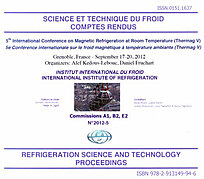
IIR document
Thermoelectric–magnetocaloric energy conversion.
Number: sect. 3
Author(s) : TOMC U., TUSEK J., KITANOVSKI A., et al.
Summary
The research and development of the magnetocaloric technology is facing several problems and limits, which represent a serious obstacle toward the industrialization. One of the largest obstacles is the operation at low frequencies and, consequently, low power densities of existing prototype devices. Introduction of new heat transfer mechanisms represent a potential solution. One of those is to introduce thermal diodes. The article deals with heat transfer analyses of hybrid magnetocaloric devices, based on solid-state thermal diodes with embodied thin plate magnetocaloric materials. For the purpose of the study, thin film Peltier elements were considered as thermal diodes. These can provide very fast heat transport from, or to the magnetocaloric material. The article presents a new, quasi 2-dimensional numerical model. The model serves for dynamic heat transfer simulations of magnetocaloric devices, which apply thermal diodes. With the small adaptation of the program, one is able to provide simulations for different types of thermal diodes. In this article, the results of numerical analyses are shown for different operating characteristics. Important guidelines for the further exploration of this promising idea are discussed.
Available documents
Format PDF
Pages: 469-476
Available
Public price
20 €
Member price*
Free
* Best rate depending on membership category (see the detailed benefits of individual and corporate memberships).
Details
- Original title: Thermoelectric–magnetocaloric energy conversion.
- Record ID : 30005596
- Languages: English
- Source: 5th International Conference on Magnetic Refrigeration at Room Temperature (Thermag V). Proceedings: Grenoble, France, September 17-20, 2012.
- Publication date: 2012/09/17
Links
See other articles from the proceedings (70)
See the conference proceedings
Indexing
-
Themes:
Caloric cooling (magnetocaloric, electrocaloric, elastocaloric and barocaloric cooling);
Other refrigerating systems (desiccant cooling, thermoelectrics, thermoacoustics…) - Keywords: Magnetic refrigerator; Magnetocaloric cooling; Heat transfer; Thermoelectricity; Mixed system; Magnetism; Peltier effect; Magnetocaloric effect; Frequency; Diode
-
Magnetocaloric versus thermoelectric effect: ne...
- Author(s) : GRÖSSINGER R., HAAS M., SATO TURTELLI R.
- Date : 2010/08/23
- Languages : English
- Source: 4th International Conference on Magnetic Refrigeration at Room Temperature (Thermag IV). Proceedings: Baotou, China, August 23-27, 2010.
- Formats : PDF
View record
-
High-frequency magnetocaloric modules with heat...
- Author(s) : EGOLF P. W., GRAVIER L., FRANCFORT T., et al.
- Date : 2012/09/17
- Languages : English
- Source: 5th International Conference on Magnetic Refrigeration at Room Temperature (Thermag V). Proceedings: Grenoble, France, September 17-20, 2012.
- Formats : PDF
View record
-
Thermo-electric calorimetry for the measurement...
- Author(s) : BASSO V., KÜPFERLING M., SASSO C. P., et al.
- Date : 2007/04/11
- Languages : English
- Source: 2nd International Conference on Magnetic Refrigeration at Room Temperature
- Formats : PDF
View record
-
A numerical optimization of a packed bed AMR.
- Author(s) : TUSEK J., SARLAH A., ZUPAN S., et al.
- Date : 2010/08/23
- Languages : English
- Source: 4th International Conference on Magnetic Refrigeration at Room Temperature (Thermag IV). Proceedings: Baotou, China, August 23-27, 2010.
- Formats : PDF
View record
-
Simulation of a hybrid magnetocaloric-thermoele...
- Author(s) : BELTRÁN-LÓPEZ J. F., PALACIOS E., VELÁZQUEZ D., et al.
- Date : 2018/09/16
- Languages : English
- Source: 8th International Conference on Caloric Cooling (Thermag VIII). Proceedings: Darmstadt, Germany, September 16-20, 2018.
- Formats : PDF
View record
